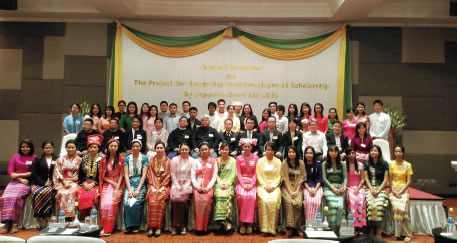Section 3 Human Resources Development
Human resources development through educational and vocational training of an appropriate quality is essential for economic growth and the solution of the poverty problems that arise from it. Assistance for human resources development to encourage productivity improvements and technological innovation is necessary not only in poor countries but also in countries that have achieved a certain level of economic growth, like Thailand for example, to ensure that they do not fall into the “middle income trap.” Human resources development is a crosssectoral issue, and in order to respond to it Japan is actually implementing a variety of initiatives using ODA.
For example, in the Japan-ASEAN Summit Meeting in 2015 Prime Minister Abe announced the Industrial Human Resource Development Cooperation Initiative based on the view that industrial human resources that are responsible for establishing and upgrading the key industries of each country are essential for the sustained growth of Asia. This initiative will assist industrial human resources development of 40,000 people in the Asia region over the three years from 2015, mainly through technical cooperation.
Specifically, in accordance with the human resources development needs of each country based on its stage of economic development, Japan is assisting in the provision of basic education in the area such as science and mathematics, enhancing higher education in engineering, and helping the development of human resources in a wide range of areas, including technicians, engineers, researchers and developers, business managers, the officials in charge of the establishment of industrial policies, etc.

The farewell event for administrative officials dispatched from Myanmar to a master's’ program in Japan (Photo: Junichi Yamazaki / Japan International Cooperation Center)
Furthermore, Japan is providing a variety of training programs in Japan tailored to the actual conditions in each developing country and region. One type of these programs provides opportunities to study at a graduate school in Japan. For example, under the Project for Human Resource Development Scholarship (JDS) a total of over 200 young officials come to Japan from approximately 10 countries every year in order to deepen their knowledge for the sake of the socio-economic development of their home countries at graduate schools in Japan.
Recently, Japanese training projects targeting not only officials, educators, and researchers but also promising business people have started. For example, the African Business Education Initiative for Youth (ABE Initiative) provides Masters Course study and experience of internships at Japanese companies to the human resources of Africa. Moreover, in TICAD VI held in Kenya in August 2016, Prime Minister Abe announced that Japan would train approximately 30,000 industrial human resources in Africa that form the core of economic activities, through research, practical studies, and business practices, including the African Business Education Initiative for Youth 2.0.
The provision of these kinds of opportunities for training in Japan also leads to the trainees participating actively in their own countries after returning home, as people with a good understanding of Japan. For example, when Japanese companies advance their economic activities in Africa, they hope that there is a possibility that they will be able to cooperate with the graduates. In the past there was an actual example of a trainee from Hanoi University of Science and Technology in Viet Nam who visited Japan for an IT education capacity enhancement project formerly implemented by JICA who after returning home started a company named after the Japanese university at which he studied, and became a human resource bridging the IT industries of Japan and Viet Nam.
Moreover, based on the Japan Revitalization Strategy 2016 approved by the Cabinet in June 2016, the Ministry of Foreign Affairs (MOFA) and JICA began a new project called Innovative Asia. This project utilizes ODA, etc. to encourage the development and circulation of highly skilled human resources so that outstanding human resources in developing countries or other places in Asia can work at companies, etc. in Japan and contribute to innovation in Japan. They will contribute to their own country’s innovation and industrial development. In the first phase of this project, Japan will establish partnerships with universities in 14 countries in Asia, including ASEAN countries, India, Sri Lanka, etc. to provide opportunities to study at graduate schools and research institutes, experience internships at companies, etc. in Japan. Under this project, the goal is to invite to Japan a total of 1,000 outstanding students involved in science and technology research over the five years from FY2017.
Furthermore, in the case that these foreign students wish to work for a fixed period in Japan, they will be able to receive preferential treatment when obtaining their status of residence in Japan (special additional points of the Points System for Highly Skilled Human Resources, etc.).
Innovation is born from the diversity of society. Through this project Japan will extend its efforts to enhance the circulation of knowledge and human resources in Asia including Japan, thereby fostering innovation, which is the foundation of sustained development of the economy, improving the lives of the people.
